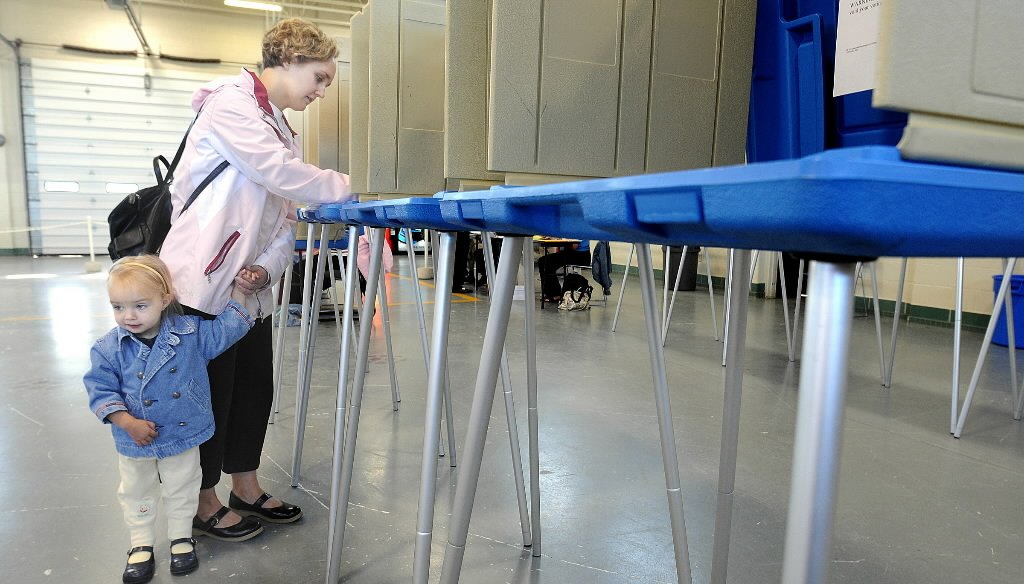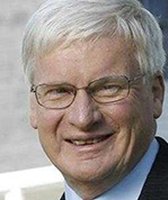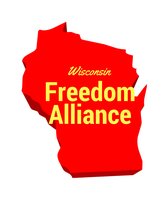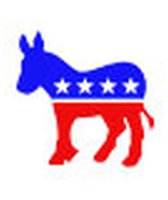Get PolitiFact in your inbox.

Wisconsin voters soon will be required to show photo IDs at the polls, under legislation signed by Gov. Scott Walker. This Journal Sentinel file photo shows a voter from Sussex in 2008.
Gov. Scott Walker has signed a photo ID requirement for Wisconsin elections starting in 2012. But debate continues to rage over the legislation -- part of a wave of such bills approved in Republican-controlled states this year.
The heated rhetoric raises interesting questions even as ID opponents mull legal action to block the Wisconsin law.
Is the law really the most restrictive in the country, as Democrats and ID critics at Common Cause and One Wisconsin Now repeatedly have claimed?
Can ID requirements that make ballot access more complicated accurately be said to "disenfranchise" voters?
PolitiFact Wisconsin strapped the Truth-O-Meter onto the first question in February. We labeled True a claim that the initial bill was "the most restrictive voter ID legislation in the nation." It was an easy call; that version excluded student IDs, passports and tribal IDs. On provisional balloting, it allowed only 24 hours to present an ID for voters who forgot it on election day.
But Republicans in charge of the Legislature later agreed to add passports and tribal IDs and opened the door for eventual acceptance of student IDs. And forgetful voters will have additional days to supply identification.
But here’s what we learned.
Even in its new form, Wisconsin’s law is one of the most restrictive, based on our research on acceptable IDs and voting procedures for those without IDs. We got information on new voter ID laws around the country from state election offices, and the National Conference of State Legislatures.
Two states pop up as contenders with Wisconsin for the title of "most restrictive."
One, Texas, which like Wisconsin passed a photo ID law in May 2011, now appears to be more restrictive, said University Wisconsin-Madison political scientist David Canon. Texas outlaws student IDs.
But Texas allows a concealed carry firearms permit as proof of identification, which Wisconsin does not. And Texas allows six days to supply missing photo ID after an election compared with three days in Wisconsin.
"They are very similar," Keesha Gaskins, a lawyer with the Brennan Center for Justice, a voting rights advocacy group that is critical of photo ID provisions, said of the Wisconsin and Texas laws.
Gaskins thinks the new law in Kansas actually might be most restrictive because of a proof of citizenship requirement.
Further muddying the waters: Wisconsin’s allowance of student IDs comes with a major caveat: Most UW System student IDs do not currently meet the law’s requirements.
As the Milwaukee Journal Sentinel reported, under the new Wisconsin law people would be allowed to vote only after showing Wisconsin driver's licenses, state-issued ID cards, certain very limited student IDs, military IDs, passports, naturalization certificates or IDs issued by a tribe based in Wisconsin. The state would issue free IDs for those lacking one of the approved cards. Those living in retirement homes, nursing homes and institutions would be exempt from the law, as would victims of stalking and those who opposed having their photos taken for religious reasons.
Wisconsin joins 12 other states that have given final or preliminary approval to laws that request or require a photo ID to vote. Most states do not, contrary to a claim by a Republican state senator that Wisconsin had been one of few states without it. We found that statement False.
The right to vote
It’s become routine for critics of photo ID to claim that voters will be "disenfranchised" when states create additional eligibility requirements such as IDs. One AFL-CIO press release even said the Wisconsin bill would "strip" hundreds of thousands of people of their constitutional right to vote.
Less frequently, ID supporters will say that vote fraud disenfranchises people by in effect cancelling out legally cast votes.
"Disenfranchised" is typically defined as "depriving" a person of a right or privilege.
Photo ID laws do not directly bar anyone from voting. They add hurdles and rules to a process that already prescribes voting hours, legal voting age and residency requirements, and -- as allowed in the U.S. Constitution -- bars felons from voting in many states.
Critics of ID provisions say it’s inevitable some voters will not learn of the requirements or be unable to fulfill them -- and be turned away at polling places. PolitiFact Texas reviewed such claim involving nuns in Indiana, rating Half True a statement that "10 retired nuns were barred from voting in the 2008 Indiana Democratic primary." Supporters say high turnout in Indiana in 2008 refutes predictions of suppressed turnout.
Let's finish up by hearing from experts and partisans on whether "disenfranchise" fits the bill.
Scot Ross, head of the liberal advocacy group One Wisconsin Now, said evidence suggests reduced voter participation is likely. "When new impediments prevent otherwise legal voters from exercising their constitutional right to vote, that is the definition of disenfranchisement."
State Rep. Jeff Stone, Republican co-author of Wisconsin’s photo ID law, said the claim that this will somehow prevent someone from voting is just false. "Requiring a photo ID in order to be given one’s ballot is not disenfranchisement, it is now one of the rules governing our election process."
Curtis Gans has mixed feelings about "disenfranchise."
"I don’t like the word," said Gans, director of the Center for the Study of the American Electorate. "I don’t think it applies." Gans sees legitimate concerns about disparate impact of the current photo ID laws on the poor, elderly and minorities, but he thinks the government could erase such concerns by distributing a "biometric" ID based on fingerprints that would register everyone to vote.
Rob Richie, executive director, Fair Vote, The Center for Voting and Democracy, uses "disenfranchise" to describe what he sees as the real-world impact of the laws.
But he agrees the term can be overstated because ID requirements are "not a fundamental loss of franchise rights."
Last word goes to Hans von Spakovsky, a prominent ID backer and former Federal Election Commission member under President George W. Bush.
Von Spakovsky said "disenfranchise" is totally inappropriate, especially when critics compare photo ID to Jim Crow laws. Von Spakovsky is senior legal fellow at the Heritage Foundation.
"I think they believe they can use it as a political weapon," he said of critics.
Our Sources
Interview with Hans von Spakovsky, senior legal fellow, The Heritage Foundation, June 9, 2011
Email interview with Rep. Jeff Stone, Republican state representative, June 8, 2011
Interview with Michael Pyritz, aide to Rep. Jeff Stone, June 8, 2011
Interview with Rob Richie, executive director, Fair Vote, June 8, 2011
Interview with Curtis Gans, director, The Center for the Study of the American Electorate, June 8, 2011
Email interviews, Scot Ross, executive director, One Wisconsin Now,
May 31 and June 9, 2011
Interview with Jay Heck, executive director, Common Cause in Wisconsin, May 31, 2011
Email interview, UW-Madison political science professor David Canon, May 31, 2011
Randall Dillard, director of communications, Office of the Texas Secretary of State, May 31, 2011
Building Confidence in U.S. Elections, Report of the Commission on Federal Election Reform, September 2005
Email interview with Reid Magney, state Government Accountability Board, June 8, 2011
National Conference of State Legislatures, Voter ID report, updated June 2, 2011
Interview with Gary Baum, spokesperson, South Carolina Election Commission, June 3, 2011
Interview with Keesha Gaskins, senior counsel, Democracy Program, Brennan Center for Justice, June 1, 2011











































